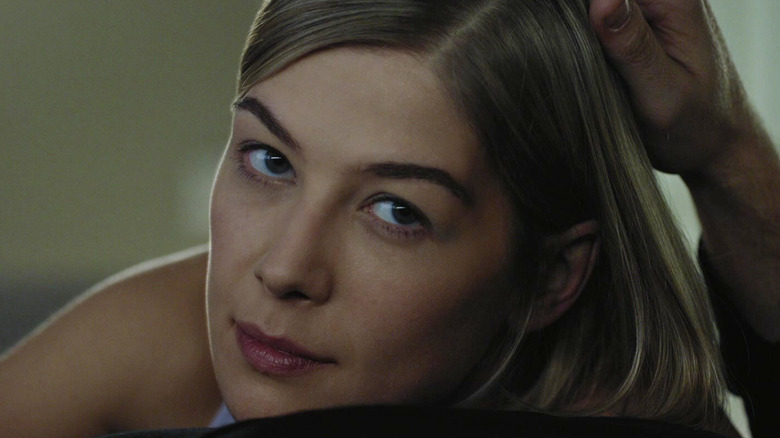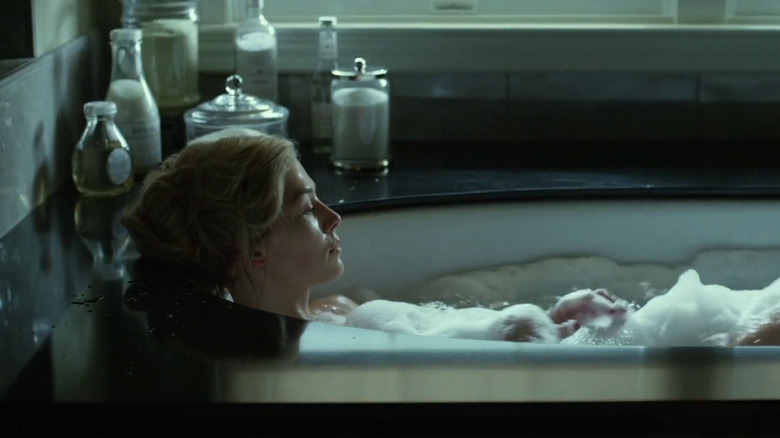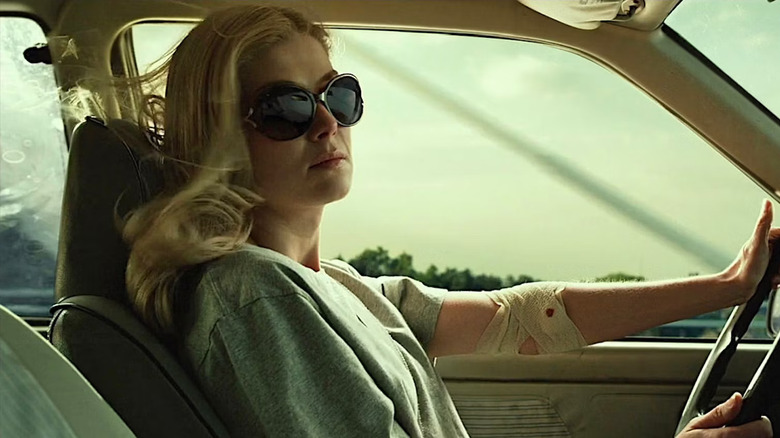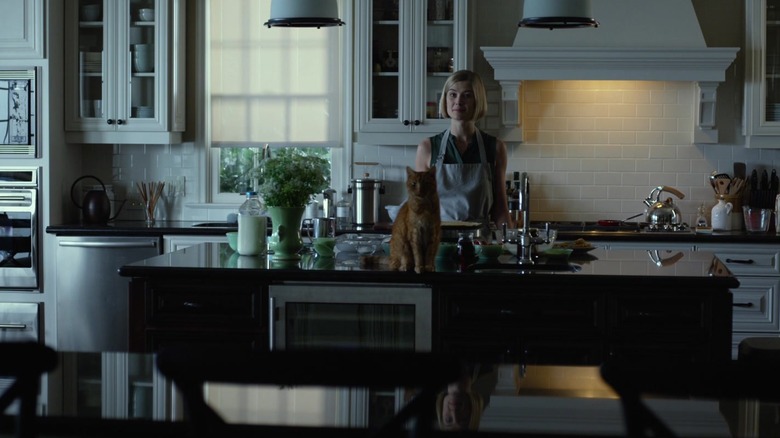10 Years Later, One Of Cinema’s Best Villains Deserves Her Spotlight
Content warning: This article discusses themes and subject matter that some readers may find triggering, including discussions of sexual assault and suicide.
Even though I knew about the midpoint twist in “Gone Girl” when I sat down in theaters to watch it 10 years ago — since I’d already read Gillian Flynn’s book — I was still struck, at the moment, by the reveal that Amy Elliott Dunne (Rosamund Pike) carefully crafted her suspicious disappearance to screw over her husband Nick (Ben Affleck). The shot of Amy in sunglasses, her arm hastily bandaged and a burger in her free hand as she drives down the highway on the morning of July 5, turns the entire story up to that point on its head. It also makes one thing quite clear: Amy is one of the best and most terrifying villains in pop culture history, and she deserves recognition.
I do want to be clear: in no way should anyone hand it to Amy Elliott Dunne. The woman is a sociopath and a killer, and in the book, she’s actually a little bit scarier (Flynn did adapt her own novel, which makes for a nice smooth transition, but in the book, Amy is horrible to men and women if they wrong her; the movie omits all but her male victims, which has the effect of making her into a sort of #MeToo nightmare). The reason that “Gone Girl” remains great 10 years later, though, is because Amy is one of the most fascinating and enthralling villains to ever appear on any sort of screen, big or small. She commits a wide variety of crimes, ruins everybody’s life in the process, and then she … basically wins the twisted game she created. By abandoning the idea that female leads need to ace some sort of purity or morality test, Flynn and director David Fincher deserve so much credit for creating a movie villain for the ages.
Amy Elliott Dune is the best on-screen representation of female rage
Again, I think it needs to be said very, very clearly: Amy Elliott Dunne is not aspirational. Honestly, the overall throughline of both Gillian Flynn’s (excellent) novel and David Fincher’s (superb) film is that people are inherently messed up and sometimes a toxic marriage or relationship can bring that mess front and center, but that’s a different article. We’re here to talk about Amy and her fury, which she rains down upon everyone around her. So why is she so angry in the first place?
Through the masterful “cool girl” monologue that’s performed in voiceover as we watch Amy concoct her escape plan, Amy tells us why and how she’s gotten to this point — which is that, as a woman, she has been treated as nothing more than an object and a stepping stone by everyone in her life. Her parents Rand (David Clennon) and Marybeth (Lisa Banes) wrote an entire book series using their daughter’s image as the protagonist — the “Amazing Amy” books — and as if it’s not insulting enough that the fictional Amy always manages to outdo the real one. Her parents ask for Amy’s trust fund, filled with “Amazing Amy” money, back when they hit hard financial times. When Nick’s mother is diagnosed with an aggressive cancer, Amy recollects that her presence in Missouri felt unnecessary (“Something to be jettisoned, if necessary. Something disposable”), and after using what’s left of her money to open a bar, Nick cheats on Amy.
When we finally see the real Amy halfway through the film, it feels like an awakening, horrifying that awakening might be. Amy is angry at Nick, her parents, and herself for playing the role all of them wanted her to fill. The genius of all of this is that Amy never feels one-dimensional or cartoonish as a villain. She has depth, even if you don’t necessarily want to explore it too much.
Even when Amy commits unspeakable crimes, she’s one of the most fascinating pop culture characters in recent memory
After leaving Nick in the lurch and setting him up for her disappearance and murder — with a plan that’s both terrifying and completely ingenious — Amy runs away and, as we see in her calendar, eventually plans on taking her own life so that Nick is arrested for her murder and receives the death penalty. When she keeps putting that off, we get our first inkling that she’s actually not going to die by suicide after all, but while hiding out at a campground in the Ozarks, she gets robbed and has to completely pivot. That pivot involves her high school boyfriend Desi Collings (Neil Patrick Harris), who takes Amy in and hides her in his guest house.
Throughout all of this, Amy is just evil. While she’s watching a show about her own disappearance with a friend at the campground, the other woman says that “Amy” seems stuck up; the real Amy, disguised with hair dye and glasses, spits in her soda. Desi is another problem entirely, as it becomes very apparent that he wants to control Amy and keep her in his guest house forever. It’s at this point that Amy commits her darkest act: murder. By framing Desi for the entire disappearance, claiming that he sexually assaulted and abused her and that she only killed him in self-defense — when, in actuality, she slit his throat during sex that she initiated — Amy’s plan changes shape yet again, making it clear that she will do quite literally anything to come out on top. That’s the thing, though. She does. Amy wins the game, so to speak.
At the end of the day, Amy wins — and gets everything she wants
The really, genuinely incredible thing about “Gone Girl” is that even though Nick is ostensibly the protagonist of the movie — sure, he’s a crappy husband, but he doesn’t really deserve all that — Amy emerges as the victor simply because nobody can possibly outsmart her. Nobody can prove that Desi, now dead, didn’t steal her from her home and hold her hostage. Nobody can prove that Nick didn’t rack up thousands of dollars worth of credit card debt all on his own (it was actually Amy, buying junk to provide more evidence against him). Amy’s final act of cruelty, though, is her most terrifying: she uses one of Nick’s sperm samples to impregnate herself, trapping Nick in their marriage for the foreseeable future.
The scene where Amy tells Nick she’s pregnant is the culmination of all of her villainy through the moment — when Nick urges her to take a test in front of him, she coolly quips, “I love tests” — and the idea of a woman like this bringing a child into the world is nothing short of terrifying. Amy doesn’t face consequences for anything that she does — which is a luxury typically afforded to men in film. Their characters get to be completely horrible and win out in the end (there are plenty of examples, but Anthony Hopkins’ Hannibal Lecter is just one of them), and nobody bats an eye. That’s why Amy is so impactful, even if she turns your stomach. She’s one of the best pop culture villains of all time and she defeats everyone in her path. Even after 10 years, she’s still “amazing” — so to speak.
If you or anyone you know has been a victim of sexual assault, help is available. Visit the Rape, Abuse & Incest National Network website or contact RAINN’s National Helpline at 1-800-656-HOPE (4673). If you or someone you know is struggling or in crisis, help is available. Call or text 988 or chat at 988lifeline.org


















Post Comment